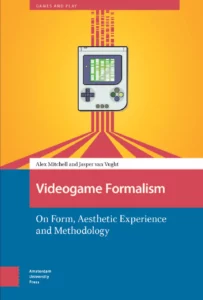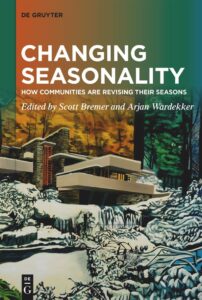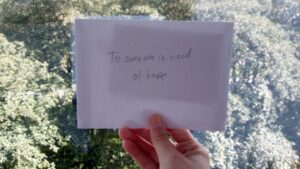Criticism and Analysis
Research and education within this theme concerns itself with understanding games as cultural productions by studying the way meaning is produced within and around them. Key perspectives are derived from often Humanities-based fields als media studies, cultural studies, gender studies, political economy studies, fan studies, production studies, and research through design.

“Beavers don’t walk on roads”: Beaver-play for more-than-human cartographies
In this paper, Laura op de Beke, Linas Kristupas Gabrielaitis, Oğuz ‘Oz’ Buruk,Velvet Spors, and Ferran Altarriba Bertran introduce the notion of beaver-play to understand play that challenges spatial conventions, transgresses boundaries, and redraws territories.

Book Launch: Four Ways of Hearing Video Game Music – Dr. Michiel Kamp
Please join us to celebrate the publication of Michiel Kamp’s Four ways of Hearing Video Game Music, published with Oxford University Press, 2024.

Book Launch: Videogame Formalism: On Form, Aesthetic Experience, and Methodology
Please join us to celebrate the publication of Alex Mitchell and Jasper van Vught’s book: Videogame Formalism: On Form, Aesthetic Experience, and Methodology, published open access with Amsterdam University Press, 2023. To mark this occasion, Alex and Jasper will give an (online) talk on:Friday, 22 March 2024, 7Am (2PM Singapore time).You can register for the

Dark seasonality in videogames
"Dark seasonality in videogames" is a chapter in the larger book Changing Seasonality: How Communities are Revising their Seasons, which explores the role of calendars, seasons, and the cultural reaffirmations (or choice not to) thereof.

Ecogames: Playful Perspectives on the Climate Crisis
Ecogames: Playful Perspectives on the Climate Crisis brings together authors who explore the aspects of ecocritical engagement in and through games.

Enhancing Effective Media and Digital Literacy through Digital Games – a Report
How we can improve media literacy skills through the use of digital games?

Climate Larps: Environmental Design in Nordic LARP
In an article published in the Journal of Analogue Game Studies Laura op de Beke discusses the role of LARP (Live Action Role Playing) games in understanding the climate crisis. Within the article she explores how the environment is considered and included within the Nordic LARP sphere.

Spationomy 2.0
The Spationomy 2.0 project was started in October of 2019, and concluded with a final conference held in November of 2022. The project was funded by the Erasmus+ program of the European Union.

Ecomodding: Understanding and Communicating the Climate Crisis by Co-Creating Commercial Video Games
This article explores how the climate crisis and specifically the underlying “crisis of the imagination” (Bendor 2018, 132) exacerbate the entrenchment of environmental communication, and how modifying commercial video games (ecomodding) can facilitate the use of games as effective communication infrastructures to address this issue. Environmental communication challenges are well-studied, but remain difficult to tackle in practice.

Taking Playful Scholarship Seriously: Discursive Game Design as a Means of Tackling Intractable Controversies
The article at hand explores the concept of playful scholarship, focusing specifically on the use of playfulness in re-assessing the collaboration between academia and societal partners to tackle “intractable policy controversies” (Schön and Rein 1994, p. 23)—i.e., challenges in which opposing parties operate with conflicting frames (often without even noticing).
